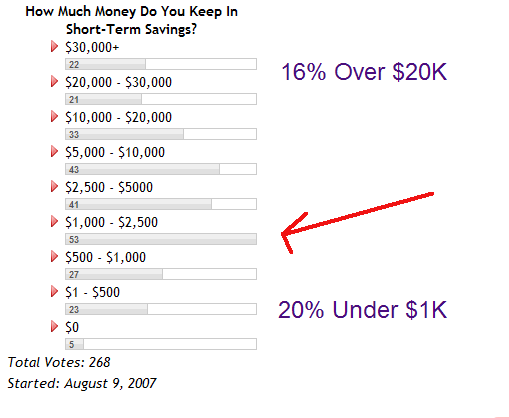In a recent poll, I asked readers to How Much Money Do You Keep In Short-Term Savings?Number of votes: 268
Here is a screen-capture of the results (so far).
So far, nearly 20% of those who voted have between $1000 and $2500 in short-term savings. A full 16% have over $20,000 in short-term savings, while another 20% have less than $1000. But, before you read anything into those numbers, read the poll comments. The real issue seems to be – How Do You Define Short-Term Savings? For now, I’m going to leave the poll open, and if you’ve yet to vote or leave a comment, feel free to do so.
I’m working on my own definition for short-term savings. For now, I’m including any money that I have, in any accounts, outside of my Retirement Accounts or Education Savings Accounts. So, my short-term savings would be equal to the total amount of money in my primary checking account, secondary checking account, savings account, and brokerage account. But, I’m not so sure that this is a satisfactory definition. So, for now, the poll stays open! Go vote!

I consider short term savings to just be my current emergency fund, outside of my retirement and other investments and my long-term savings which is 3-6 months of income in case of sudden job loss.
Interesting poll, NCN — although when I first read the title, I thought of my emergency fund and not my primary checking account.
I don’t keep a lot of money in my checking account, which is mainly for paychecks going in and bills going out.
This really is an interesting poll, NCN! I have $1150 in my emergency fund, although two weeks ago I would have been able to check the $2500-$5000 one since I had been saving up for my tuition payment. Another semester…another round of padding the account! But it truly makes life easier to save up and plan for expected expenses, above and beyond the emergency fund which does not get touched unless it really is an emergency.